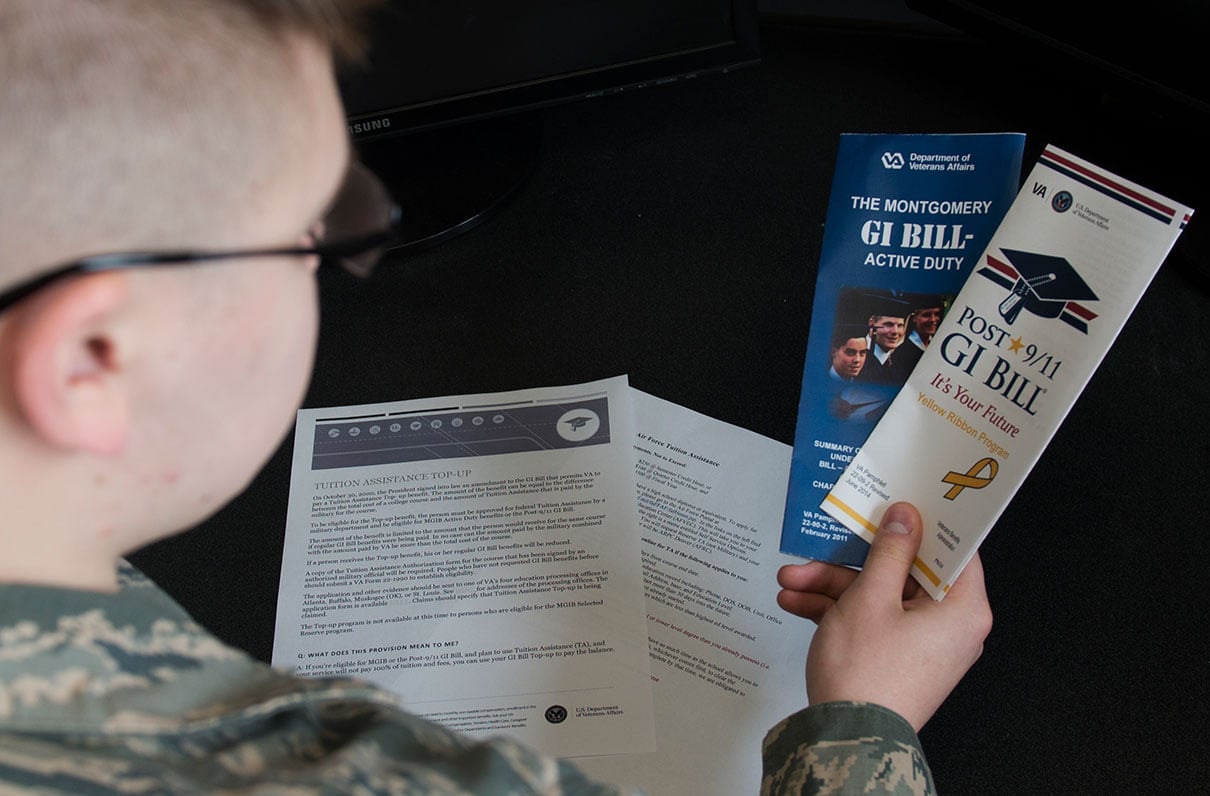(Updated Nov. 28 with new VA policy; updated Nov. 29 with VA officials' comments regarding new policy, and with the VA secretary's follow-up comments)
The VA will "reset its implementation efforts" on new GI Bill housing stipend rules, officials announced Wednesday, meaning student-veterans won't get the amounts promised under "Forever GI Bill" legislation until December 2019, more than a year after the effective date in the law itself.
The move comes after lawmakers from both parties pressed VA officials for an estimate on when the changes would go into effect and a backlog of education claims would be cleared. VA had 49,483 pending Post-9/11 GI Bill claims in its system as of Nov. 19, according to a media release.
Student-veterans will continue to receive stipends, but the process will change beginning Friday. Per Wednesday's release, the system will:
- Pay out housing stipends using DoD's Basic Allowance for Housing (BAH) rates for the current academic year. Students slated to receive more than that amount under Forever GI Bill legislation eventually would receive the full amount; those who will receive more than what they'd expected will be allowed to keep the difference.
- Pay out housing allowances based on the location of a school's main campus, not the student's location. This change would mean more money for students registered at schools in urban areas who take classes in rural locations, but could mean difficulty for those who took a big-city internship set up via their small-town school and expected a large stipend.
- Define a "campus" as a site owned or leased by the school, and where the school controls the faculty. This move "reduces the administrative burden for schools and students," per the release.
"Each and every, and I mean every single veteran, will be made whole for their housing benefits this year," VA Under Secretary Paul Lawrence told lawmakers Thursday during a hearing before the House Veterans' Affairs Committee's disability assistance and memorial affairs subcommittee.
Veterans with special circumstances - for instance, those attending classes in an area with a higher housing stipend who will no longer receive that higher stipend under the new rules - may not be made whole via the same process as others using the benefit. Lawrence said the VA would work with lawmakers to look into those cases, but added that consideration would be made regarding the allocation of staff resources.
"Is all the processing going to end up with one person getting a check for a dollar? We don't know that yet," Lawrence said. "It's not our intention to harm veterans, but it's also our intention to process the GI Bill effectively and accurately going forward."
After the hearing, VA Secretary Robert Wilkie made clear that the department plans ensure "each and every beneficiary will receive retroactively the exact benefits to which they are entitled under that law."
How We Got Here
Congressional inquiries into the program came after reports that some student-veterans, especially those in metropolitan areas with monthly housing stipends that can exceed $3,000, were struggling to pay rent or faced removal from school.
In a Nov. 15 interview for an upcoming edition of Military Officer magazine, Wilkie said he's received no reports of student-veterans being evicted.
“We have asked anyone who has a hardship to tell us,” Wilkie said. “We have about 800 cases that have been identified across the country that we've put to the top of the list.”
In the Nov. 28 release, Wilkie said making the change during the busy registration season "was like flying a plane while building it, and that was unfair and frustrating to veterans and taxpayers. That's why we are resetting our implementation of the law for the next year to ensure we get the technology and formula right to put veterans first."
Changes to the housing stipends - including requiring the VA to pay students based on their physical location, not the location of their school's campus - were to take effect Aug. 1. Tests prior to that date revealed “critical errors” in VA's processing system, so “VA decided to postpone deployment until it could develop a functional and efficient housing stipend calculation capability,” per a Nov. 19 news release. Wednesday's release says that capability will be online by Dec. 1, 2019, in time to process enrollments for classes in the spring of 2020.
[RELATED: VA Leaders Vow Post-9/11 GI Bill Allowance Delays Near Over]
“We are doing these corrections deliberately and carefully,” Wilkie told Military Officer, “and we're doing everything we can to make sure that there's no hardships.”
About 825 unprocessed claims were more than 60 days old as of Nov. 19, per the VA. Another 9,863 were pending between 30 and 60 days as of Nov. 16, according to an earlier version of the news release. The VA already has processed more than 700,000 education claims for the fall semester, officials said, with less than 4.5 percent of them taking longer than two months.
How to Get Help
For students who receive timely payments, the technical problems will amount to underpayments of about 1 percent in most cases, per the VA. Those facing financial hardship can contact VA via the Education Call Center at (888) 442-4551 or via the GI Bill website.
Hardship claims “are expedited for immediate processing,” per the Nov. 19 news release.
Veterans can also contact state and local agencies for aid. New York City, for example, announced in an Oct. 25 news release that it will provide “emergency rent assistance to any enrolled student veteran who qualifies.” Details on that aid are available here (PDF) or by emailing info@veterans.nyc.gov.
